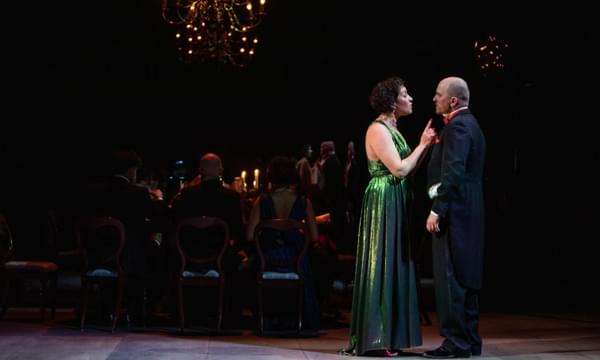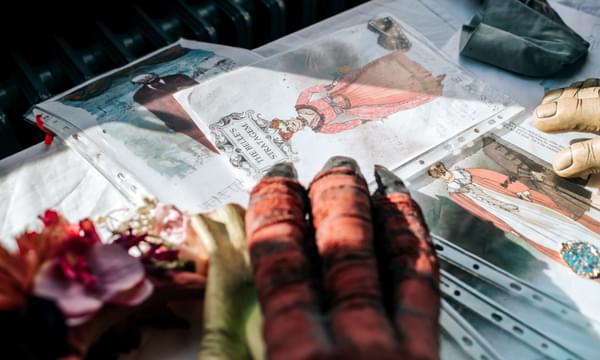News Story
Development workshops are a staple here at The Lyceum. We use them for a variety of different reasons but as a producing theatre, making new shows is what we do, and that process isn’t always an easy one.
So, what is a development workshop?
In this case, the purpose of these workshops is for the playwright to get in a room of people and share their work so far. They ask for honest feedback and look at scenes on their feet as well as possibly coming up with new elements to their script. This helps them to identify any problems, any plot-holes, any characters that need work and anything else that might pop up in the room. The workshops are there to solve problems that the playwright might be having...but often they can also create new problems too. Playwrights rarely work on their own, after forming an idea in their head and writing a first draft, outside eyes and outside perspective can really help the shape and form of a piece.
The workshop
Having finished the second draft (not final) of the play at 5pm the day before, this workshop was the first time that Zinnie had heard her words read aloud from start to finish. This is, of course, a nerve-wracking time for any playwright as you have spent months making your idea a reality. Deep breath.
Psst! Between me and you...the script is incredible!


How are the days structured?
Sometimes the workshop content is decided as the days go along so there isn’t a schedule, for other practitioners a schedule is how they make sense and use the time most effectively. Each workshop is different and is designed and planned around the playwright or professional running them.
Zinnie came to the workshop with some big questions that she wanted to answer over the space of the 3 days; does the language of the play work, do the characters make sense (no spoilers) and is the ending right (when I say big questions, I meant it). These questions will be answered through different exercises, either by sitting, reading and analysing through honest conversations or alternatively they may feel like the scene needs to be up on its feet to see if it works.
Literary analysis
One big question that was being explored was about the use of language in the piece and the overall structure of the script and the character representation through language. Literary analysis and dramaturgical beats are two things that were spoken about a lot in this first day. They may seem like big concepts that you haven’t heard about before, but I promise, you do this whenever you are creating work or talking about a play. Dramaturgical beats are basically the story broken down into units, the beats are the key moments within the story that need to be hit for it to reflect the playwright's vision. Literary analysis is simply focusing on the language used and if it works for each character/scene, breaking apart lines and making sure they make sense in each moment.
These concepts were at the forefront of the creative's heads for the whole three days, reading and re-reading scenes, talking about plot holes and moments that didn’t quite make sense, moments where characters felt unnecessary, or their language didn’t match the scene or their current emotion/context. The slight change of a word can completely change how an audience or an actor responds to a scene, whether that is the word that is used or the way it is said.... even who is saying it. Language and structure of a script is something that is essential to get right before rehearsals begin. The rehearsals for Macbeth (an undoing) are only 3 weeks long so there isn’t space to be re-writing scenes and changing language, this must be finalised in advance. If the actor reading the part has moments that are jarring to them or feel unnatural to read, these workshops are there to iron those moments out.
After the workshops, Zinnie will go away and write another draft of the script considering all the things discussed over the course of the 3 days. It was amazing to feel the energy in the room, the amazement from those reading Zinnie’s words and the excitement about getting to see this production when finished. There was a real sense of how great this performance is going to be and something that everyone in the room wishes they wrote first!
Unfortunately, I can’t give you any specific detail about what happened in the workshops and what was discussed – you’ll just have to come and see the show!
Here are our tips to use for your own play analysis/devising work
Literary analysis and dramaturgical beats are something that you can take from our professional practice to use in your own work, whether you are a budding playwright or devising your own piece of work. Taking the time to look at your speeches and dialogue can really help you make an engaging performance.
- Break your script down, think about the character and if the language used reflects them and the moment within the play.
- Does the characters story arc make sense? Plot it out on post-its.
- Does the character come across as you want them to in each scene? Give them context and a relationship with others in the scene and does the language reflect that?
- Try characters swapping lines. This might help find meaning and give that character a side that you didn’t know they had.
- When re-reading, give yourself a focus to think about when listening to the lines this can help channel your thoughts rather than trying to think about too much at once.
- Read scenes with specific thoughts in your head about what characters are experiencing within that moment and what their motive is for that scene. Is it the language that needs changing or is it the way it is performed?
- Mediate your analysis. Come with pre-planned questions and work through them. Others might come up, but this will help focus you.
- Find patterns and repetition in the work. What are these patterns saying? Do they give meaning?
- Bring a pencil, be an active listener. Write down thoughts as they come to you when reading so you can refer to them rather than relying on memory.


One last thing, I asked the actors in the space what their tips were for those who are analysing a play script. Whether that is in a professional capacity or if you are wanting to run your own development workshop at school. Script analysis is key when approaching a new role as an actor or even as a designer, exploring what is the script and language trying to say is important.
- Read the whole script and familiarise yourself with all the story not just key moments
- Don’t be afraid to try things and push the character you are reading in a different way than you thought. First instinct might not always be the best
- Imagine you are performing the lines to an audience so that you can really see if things are working or not. It will never sound good if you don’t believe it so the analysis will never be 100% truthful.
- Be creative
- Ask questions, contribute to conversations, be engaged in the material and the room.
- Be honest
- Bring a pencil


